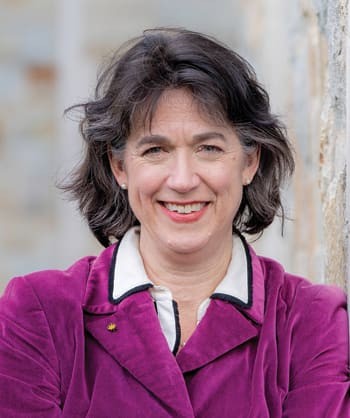

Professor

Stokes Hall Room S317
Telephone: 617-552-8803
Email: conevery.valencius@bc.edu
ORCID 0000-0002-5513-4407
U.S. environmental history; history of the earth sciences; history of medicine and health; energy history; history of seismology; women’s health; history of the U.S. Civil War; travel narratives; the American West; 19th-century American history
Conevery Bolton Valencius (CON-a-very va-LEN-chus) writes and teaches about the history of environments, health, and energy. She is a Professor of History and serves on the Steering Committee for Environmental Studies. She is a Faculty Affiliate of the Schiller Institute for Integrated Science and Society.
With co-author and science journalist Anna Kuchment, Valencius is writing a book about mid-American scientists confronting connections between alarming recent earthquakes and the fracking boom. Her 2025 Distinguished Lecture at the History of Science Society annual meeting drew on that research into seismology and shale formations.
Valencius directs the Neponset River Lab, a collaborative team of graduate and undergraduate students who create an interactive historical map of places along the estuary of this overlooked Boston waterway. “Mapping the Neponset” is hosted by the Neponset River Watershed Association (https://neponset.org/mapping-the-neponset-river/). In 2026 an Integrative Learning Grant will support a new History seminar in which undergraduates will learn about the connections between the Neponset River and US history and craft further contributions to this map.
Valencius earned a PhD in the History of Science from Harvard University in 1998. In February 2022 she was named a Fellow of the American Association for the Advancement of Science. Her work has been supported by fellowships from the National Endowment for the Humanities, the Radcliffe Institute for Advanced Study, and the Dibner Institute for the History of Science and Technology. Valencius has earned awards from the History of Science Society, the American Society for Environmental History, and the Society of American Historians. A graduate of Little Rock Central High School who write about the history of her home region, she was named an Arkansas Traveler by gubernatorial proclamation.
She has previously written two books: The Health of the Country: How American Settlers Understood Themselves and Their Land (Basic Books, 2002) and The Lost History of the New Madrid Earthquakes (University of Chicago Press, 2013). Other recent projects involve World War I aviation and film, the history of the Cape Ann earthquakes, and artworks at the McMullen Museum.
Valencius is founder and co-convenor of the Bodies and Places Working Group for faculty and graduate students in the History Department and advises both graduate students and undergraduate thesis writers. She is a former advisor to an energetic, now-graduated Girl Scout troop and serves on the board of a foundation supporting the innovative Ummeed Child Development Center in Mumbai, India.
Valencius teaches courses on US energy system and environments, including “This Land is Your Land,” her long-running survey of US environmental history. In the Boston College interdisciplinary Core program, she worked with scientist colleagues to develop and co-teach “Powering America” on the history and technology of American energy systems and (in 2026) “Take Me to the River,” on the hydrology and history of American waterways.
The Lost History of the New Madrid Earthquakes (The University of Chicago Press, 2013, paperback, 2014). “Recommended summer book:” Nature, 2014.
“The Health of the Country:” How American Settlers Understood Themselves and Their Land. (Basic Books, 2002). 2003 George Perkins Marsh Prize and the 1999 Allan Nevins Prize.
“Wings (1927): Aviation, War, and Energy,” in American Energy Cinema, ed. Robert Lifset, Raechel Lutz, and Sarah Stanford-McIntyre, coming out spring 2023 with West Virginia University Press.
“John Winthrop’s Lecture on Earthquakes (1755) and ‘Pestilential Distempers’ Caused by Environmental Disruption,” in “The History of Contagion in Harvard Library Collections,” a project responding to the COVID pandemic (July 2021).
Science in Early America: Print Culture and the Sciences of Territoriality, with David I. Spanagel, Emily Pawley, Sara Sidstone Gronim, and Paul Lucier, Journal of the Early Republic, 36, no 1. (Spring 2016): 73-123.
Op-ed, Arkansas Democrat-Gazette, “Stop Pretending: State has quakes; be prepared,” 14 August 2015.
Teaching Chekhov as Environmental History: Sakhalin Island and Cold Climates, in Michael C. Finke and Michael Holquist, eds., Approaches to Teaching the Works of Anton Chekhov, MLA Approaches to Teaching World Literature series (NY: Modern Language Association, 2016): 171-178.
Accounts of the New Madrid earthquakes: personal narratives and seismology over the last two centuries, in Deborah R. Coen, ed., Witness to Disaster: Earthquakes and Expertise in Comparative Perspective, special issue of Science in Context, 25, no. 1 (February 2012): 17-48.
Sacagawea’s “Cold”: Pregnancy and the Written Record of the Lewis and Clark Expedition, with Peter J. Kastor, Bulletin of the History of Medicine 82 (Summer 2008): 276-310. Awarded the 2012 Awarded the 2012 History of Science Society Margaret Rossiter History of Women in Science Prize.
“The Forgotten Earthquakes that Reshaped America,” Colloquy podcast of the Graduate School of Arts & Sciences, Harvard University, April 2022.
The New Madrid earthquakes in Arkansas History, Arkansas Humanities Council podcast by Dr. Heather McNamee, May 2021.
“Getting Sick and Getting Well: How Americans Have Understood Disease and Health,” COVID-era conversation with Patty Limerick at Colorado’s Center of the American West, 1 Oct 2020.
U.S. Grant History Chat with Park Ranger Nick Sacco, 11 June 2020 of the Ulysses S. Grant National Historic Site.